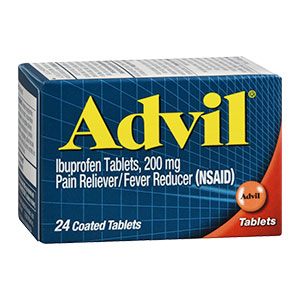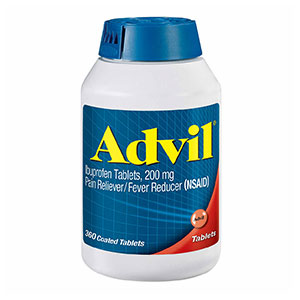The largest price comparison for medicines: the most popular pharmacies in comparison. Buy more than 200 medicines at low prices






Patent: Patent expired
Producer: Pfizer Pharma GmbH
Dosage: 200mg
Dosage form: tablet
Unit of measurement: mg
Active ingredient: ibuprofen
Application areas:
Pain
Drug class:
Onset of action:
Duration of action:
Available in: 0 Pharmacy(s)

Other names: (RS)-2-(4-Isobutylphenyl)propionsäure
Bioavailability: 50-100%
ATC-Code: C01EB16
Protein binding: ≥ 90%
Metabolism: Liver
Metabolites:
Half-life: 2-4 hours
Excretion: Urine
CAS number: 15687-27-1
PubChem-CID: 3672
Drug Bank: DB01050
ChemSpider: 3544
UNII: WK2XYI10QM
KEGG: D00126
ChEBI: CHEBI:5855
ChEMBL: ChEMBL521
ECHA-InfoCard: 100.036.152
Formula: C13H18O2
Molar mass: 206,28 g·mol−1
Advil inhibits cyclooxygenases, the enzymes that help produce prostaglandins and thromboxane. Prostaglandins are involved in mediating pain and fever. Thromboxane is involved in promoting blood clots and cyclooxygenases also help maintain a protective lining of the stomach lining.
The therapeutic effects of Advil for pain relief and fever reduction are due to the reduced effect of prostaglandins. The gastrointestinal side effects of Advil are also related to its inhibition of cyclooxygenases and thromboxane.
The effects usually last four to eight hours.
The tablets are taken orally with enough water. Take Advil with food or milk to relieve stomach upset.
The recommended dose for adults and adolescents 12 years and older is one 200 mg tablet every 4 to 6 hours until symptoms disappear. If the pain or fever does not go away, you can take 2 tablets. An Advil overdose can damage your stomach or intestines. The maximum amount of ibuprofen for adults is 800 milligrams per dose or 3200 mg per day (4 maximum doses).
The child's dose of Advil depends on their age and weight.
risk of heart attack
Possible interactions with other drugs
Hypersensitivity to the ingredients
Stomach ulcers
Heart problems such as a heart attack, irregular heartbeat, angina, chest pain, aortic stenosis, or heart failure
Kidney diseases
Liver diseases
Not safe
Taking Advil during the last 3 months of pregnancy may harm an unborn baby. Do not use this medicine without medical advice if you are pregnant.
Alcohol consumption should be avoided
If you miss a dose, do not take twice as much the next time, but take it as described in the dosage instructions or as instructed by your doctor
If you take more than you should, gastrointestinal upset may occur.
There is a risk of significant interactions. Therefore, medical supervision is recommended.
Allergic reaction
Hives
Skin rash
The effect of the drug is influenced by the food.
Keep this medicine out of the sight and reach of children.
What pain does Advil help with?


Can I take Advil if I have a cold?


How many pills to take for a headache?


What are the most common side effects?


Where to order Advil tablets online?


Advil, an over-the-counter drug, is a trade name for ibuprofen, a nonsteroidal anti-inflammatory drug used to treat mild pain.
Each Advil tablet contains 200 mg ibuprofen. Ibuprofen also comes in a generic form and is the active ingredient in another supplement, Motrin.
Advil is used for a variety of medical conditions. You can use it for pain relief, reducing inflammation, and lowering your body temperature when you have a fever. It is taken in the following cases:
It should be noted that Advil is used to temporarily relieve symptoms, which means it will not cure the condition.
You can order Advil in the following dosage forms: tablets, syrup, suspensions and liqui gel. In addition to these application forms, there is the substance ibuprofen in the form of sustained-release tablets, soft capsules, suppositories, effervescent granules and creams on the German market.
You can buy Advil online without a prescription. However, if you have any concerns about side effects, interactions with any medications you are taking, or any other questions about Advil, you should consult a doctor or pharmacist before taking it.
Please note that you will not find Advil in the stationary pharmacies in Germany. Throughout Germany, ibuprofen is offered under other trade names.
It is recommended not to take Advil tablets with alcohol. Advil is capable of causing severe stomach bleeding, especially when taken in higher doses for a long period of time. This risk increases if the patient consumes 3 or more alcohol drinks per day while taking Advil.
The medicine Advil can cause an upset stomach. To reduce the risk of stomach upset, this medication should be taken with food or milk.
Bleeding can also occur during use, most commonly stomach bleeding. It is important to recognize the symptoms of stomach bleeding, such as dark stools, tiredness, dizziness and bloody vomiting, in good time.
The other possible side effects of Advil tablets are easy bruising, blood in the urine and bleeding in the eye.
Rarely, it can cause allergies, hives, facial swelling, asthma, rash, blisters, or shock.
Advil may increase the risk of kidney damage. This risk is increased in patients with dehydration or volume depletion.
If you have an underlying kidney disease, e.g. B. due to diabetes, high blood pressure or another cause, you should avoid Advil. If you need to take it, please make sure you are not dehydrated.
This pain reliever can also lower sodium levels and increase blood potassium levels. If you are taking the blood pressure lowering medications that tend to increase potassium levels or decrease sodium levels, refrain from taking Advil.
Advil can also induce volume overload. Therefore, simultaneous administration with medication for drainage is not recommended.
These painkillers can increase the risk of heart attack or stroke. The risk increases with higher doses or prolonged use of Advil.
Advil can interact with other medicines, including blood pressure medicines and anticoagulants. It's important to tell your doctor or pharmacist if you're taking any other medications that may interact with Advil. Caution is advised not only with prescription but also with herbal medicines. For example, Advil interacts with Ginkgo biloba, which is used for memory problems.
These are just some of the medicines and substances that interact with Advil: beta-blockers (used to treat high blood pressure); Antidepressants, diuretics, etc.
If you suffer from asthma, you should consult a doctor or pharmacist before ordering Advil. This is because the active ingredient, ibuprofen, can cause or worsen asthma symptoms or cause inflammation of the inside of your nose.
itemizations

I take Advil for my migraines (about 2-3 times a month), which in severe cases mean I have to go to bed and vomit. Since I've been taking Advil whenever the migraine starts, I haven't had any more migraine problems.
13.04.2021


Subscribe to our newsletter and get the latest updates and special offers!
Leave a comment
Thank you for sharing your experience!
Your experiences will be published soon!